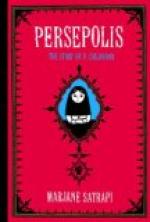“Tom Jones and Grey’s Elegey in a country churchyard are both excellent, and much spoke of by both sex, particularly by the men.” Are our Marjories nowadays better or worse because they cannot read Tom Jones unharmed? More better than worse; but who among them can repeat Gray’s Lines on a distant prospect of Eton College as could our Maidie?
Here is some more of her prattle: “I went into Isabella’s bed to make her smile like the Genius Demedicus” (the Venus de Medicis) “or the statute in an ancient Greece, but she fell asleep in my very face, at which my anger broke forth, so that I awoke her from a comfortable nap. All was now hushed up again, but again my anger burst forth at her biding me get up.”
She begins thus loftily,—
“Death the righteous love
to see,
But from it doth the wicked
flee.”
Then suddenly breaks off as if with laughter,—
“I am sure they fly as fast as their legs can carry them!”
“There is a thing I love to
see,—
That is, our monkey catch
a flee!”
“I love in Isa’s bed
to lie,—
Oh, such a joy and luxury!
The bottom of the bed I sleep,
And with great care within
I creep;
Oft I embrace her feet of
lillys,
But she has goton all the
pillys.
Her neck I never can embrace,
But I do hug her feet in place.”
How childish and yet how strong and free is her use of words!—“I lay at the foot of the bed because Isabella said I disturbed her by continial fighting and kicking, but I was very dull, and continially at work reading the Arabian Nights, which I could not have done if I had slept at the top. I am reading the Mysteries of Udolpho. I am much interested in the fate of poor, poor Emily.”
Here is one of her swains:—
“Very soft and white his cheeks;
His hair is red, and grey
his breeks;
His tooth is like the daisy
fair:
His only fault is in his hair.”
This is a higher flight:—
“DEDICATED TO MRS. H. CRAWFORD BY THE AUTHOR, M.F.
“Three turkeys fair their
last have breathed,
And now this world forever
leaved;
Their father, and their mother
too,
They sigh and weep as well
as you:
Indeed, the rats their bones
have crunched;
Into eternity theire laanched.
A direful death indeed they
had,
As wad put any parent mad;
But she was more than usual
calm:
She did not give a single
dam.”
This last word is saved from all sin by its tender age, not to speak of the want of the n. We fear “she” is the abandoned mother, in spite of her previous sighs and tears.
“Isabella says when we pray we should pray fervently, and not rattel over a prayer,—for that we are kneeling at the footstool of our Lord and Creator, who saves us from eternal damnation, and from unquestionable fire and brimston.”




